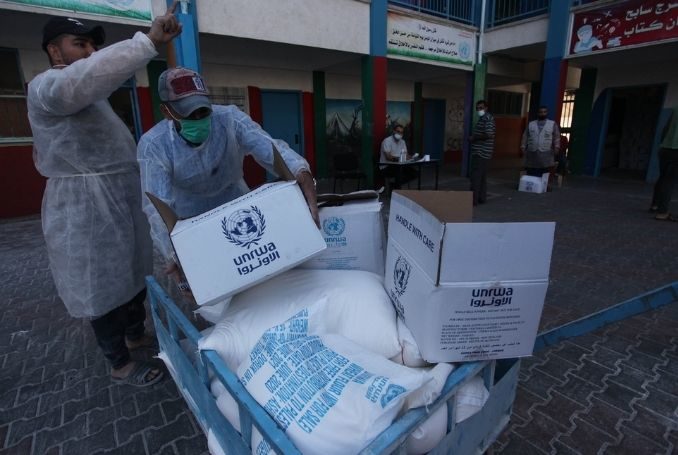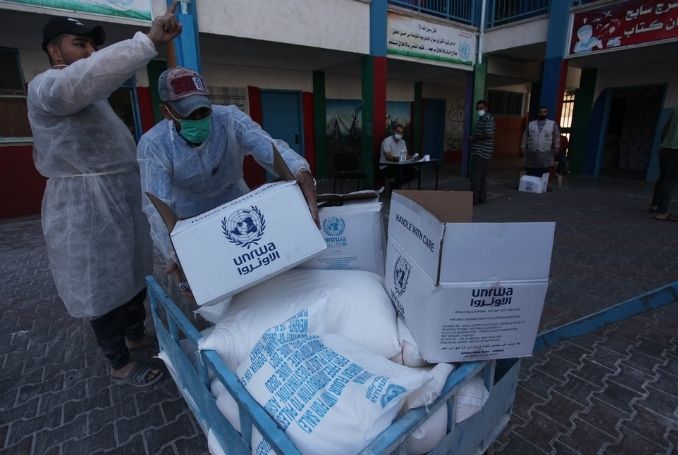
Humanitarian aid trucks have been prevented from entering Gaza. (Photo: Mahmoud Ajjour, The Palestine Chronicle)
Israeli army admits to destroying vast stockpiles of food and medicine meant for Gaza, as starvation deaths rise and global outrage mounts.
In a stark escalation of the humanitarian crisis in the besieged Gaza Strip, the Israeli Broadcasting Corporation (KAN) has confirmed that the Israeli military destroyed tens of thousands of relief packages—including large quantities of food and medicine—intended for the enclave’s starving population.
Citing Israeli military sources, the report revealed that more than 1,000 truckloads of humanitarian aid were deliberately destroyed.
The same sources admitted, “There are thousands of parcels left under the sun, and if they are not transported to Gaza, we will be forced to destroy them.” Despite mounting international pressure to facilitate aid delivery, the Israeli authorities claimed the destruction was due to alleged failures in the “aid distribution mechanism” within Gaza.
The move has triggered widespread condemnation as it comes amid what humanitarian experts and international organizations are calling an unprecedented famine. The entire population of the Gaza Strip—over 2.3 million people—has been pushed to the brink of survival by over 21 months of war, siege, and deliberate starvation policies.
Bombshell report: The IDF admitted it destroyed and buried the contents of 1,000(!) aid trucks—because the supplies expired while Israel delayed and mishandled distribution.
In case anyone telling you it’s the UN’s fault. pic.twitter.com/FgxUxRGGIV
— Etan Nechin (@Etanetan23) July 25, 2025
Reports from inside Gaza describe an increasingly grim reality: people surviving on animal feed, grass, or nothing at all. Displaced families now rely on potato peels, scavenged weeds, or flour made from dried corn husks, as access to basic foodstuffs has all but collapsed. In hospitals and shelters, doctors report rising deaths from malnutrition, particularly among children, the elderly, and those with chronic illnesses.
According to the Ministry of Health in Gaza, 122 people—mostly children—have already died from starvation-related causes. Recent statistics show that 11.5% of children are suffering from severe acute malnutrition, a rate considered catastrophic by global health standards. Aid groups warn that those figures likely underestimate the real toll, given the collapse of healthcare and monitoring systems across much of the territory.
The destruction of humanitarian supplies is not an isolated incident but part of a larger pattern of obstruction. Israel has maintained a tight blockade on the Gaza Strip for nearly two decades, but conditions have dramatically worsened since the war began.
International NGOs and UN agencies have repeatedly accused the Israeli government of blocking or delaying aid shipments, sometimes for weeks, while tens of thousands of tons of food, water, and medical equipment rot at crossing points.
Calls for accountability are growing louder. In an interview with Al Jazeera this week, UN Special Rapporteur on the Right to Food, Michael Fakhri, condemned Israel’s actions in the strongest terms.
“We need sanctions now,” he said. “Condemnations are not enough. Israel is obstructing the entry of aid, which is piling up at the borders in full view of the world.”
Fakhri emphasized that aid agencies are unable to operate freely and that the starvation of Gaza’s population must be recognized as a form of collective punishment—and possibly a component of genocide. He added that continued Arab and international pressure is essential to break the blockade and deliver urgent relief.
Gaza Famine Death Toll Rises to 122, Including 83 Children
Meanwhile, public anger is erupting across the globe. In recent days, mass demonstrations have been held in major cities—including London, New York, Paris, Istanbul, and Johannesburg—demanding an immediate ceasefire, an end to the blockade, and full, unrestricted humanitarian access to Gaza.
These developments come at a moment of heightened scrutiny for the Israeli government, which faces increasing diplomatic isolation. Human rights organizations, including Amnesty International and Human Rights Watch, have accused Israel of using starvation as a weapon of war.
A growing number of legal scholars and UN officials argue that Israel’s actions may constitute a violation of the Genocide Convention and international humanitarian law.
Despite this, Israeli officials continue to deflect responsibility. Government spokespersons have claimed that the failure to distribute aid is due to the collapse of civil infrastructure in Gaza—ignoring the fact that much of that infrastructure was systematically targeted and destroyed by Israeli bombing.
(PC, AJA)


